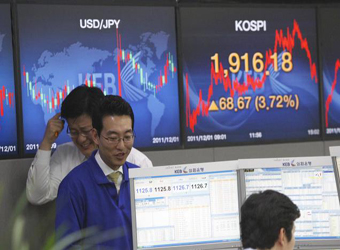Japan’s benchmark Nikkei 225 pared gains of more than 1 percent seen earlier to dip 0.1 percent as the yen firmed slightly after falling overnight. The broader Topix retraced earlier gains to slip 0.44 percent.
The pharmaceuticals sector declined as shares of Takeda Pharmaceutical dropped 7.07 percent. The Japanese company said Wednesday that it was at “a preliminary and exploratory stage” regarding a possible bid for U.K. drugmaker Shire.
Elsewhere, the Kospi tacked on 0.11 percent as manufacturing names and automakers traded in negative territory. Despite the broader move lower, Samsung Electronics edged up by 0.37 percent.
Hong Kong’s Hang Seng Index was off by 0.17 percent as technology and energy stocks lagged. Heavyweight Tencent was off by 0.29 percent and Apple supplier AAC Technologies was down 1.62 percent after the smartphone components maker declined in U.S. trade.
Casino plays, however, traded higher, with Wynn Macau and Sands China rising 1.26 percent and 1.21 percent, respectively.
Mainland markets were little changed: The Shanghai composite tacked on 0.09 percent and the smaller Shenzhen composite added 0.04 percent.
Down Under, the ASX 200 edged down 0.61 percent, paring slim gains seen earlier in the morning. The materials sector and gold producers lagged the broader market. Markets in India were closed on Thursday.
U.S. technology stocks fell on Wednesday, with Amazon, Netflix and Apple losing 4.4 percent, 5 percent and 1.1 percent, respectively. The declines saw the tech-heavy Nasdaq composite close down 0.85 percent.
Other U.S. stock indexes recorded slighter losses, with the Dow Jones industrial average slipping 0.04 percent after trading in a wide range through the day.
Technology shares stumbled earlier in the week, bringing an end to a brief rally in markets linked to an apparent easing in trade tensions.
Trade issues also continued to simmer as global markets watched for developments in U.S.-China trade ties after President Donald Trump signed an executive memorandum earlier this month that could put tariffs on up to $60 billion in Chinese goods.
China was still weighing the possibility of imposing curbs on U.S. soybean imports, Reuters reported on Thursday.
Meanwhile, U.S. government debt yields slipped as investors turned to traditionally safer assets. That yield on the 10-year Treasury note stood at 2.77 percent on Thursday after touching its lowest levels in seven weeks in the last session. (Bond yields move inversely to their prices.)
“Uncertainty about trade discussions and end-quarter buying supported fixed income across the board,” said ANZ Research analysts in a morning note.
Investors also took note of developments ahead of potential talks between the U.S. and North Korea after China confirmed that North Korean leader Kim Jong Un met with Chinese President Xi Jinping for talks.
China said on Wednesday that North Korea has agreed to denuclearize, although the latter has not publicly commented on the matter.
In currencies, the dollar index, which tracks the U.S. currency against six peers, stood at 89.954 at 12:41 p.m. HK/SIN, slipping from a one-week high touched overnight.
Against the yen, the greenback pared some of its overnight gains to trade at 106.53, compared to a high of 106.86 seen overnight. The dollar traded at levels around the 105 handle at the beginning of the week.
The moves in the yen come as month-end, quarter-end, as well as year-end for many Japanese corporates flows were also figuring in foreign exchange moves, Ray Attrill, head of foreign exchange strategy at National Australia Bank, said in a note.
On the data front, retail sales in Japan increased 1.6 percent in February compared to one year ago, slightly missing a forecast of a 1.7 percent rise, Reuters reported. Source: CNBC
Source: CNBC


